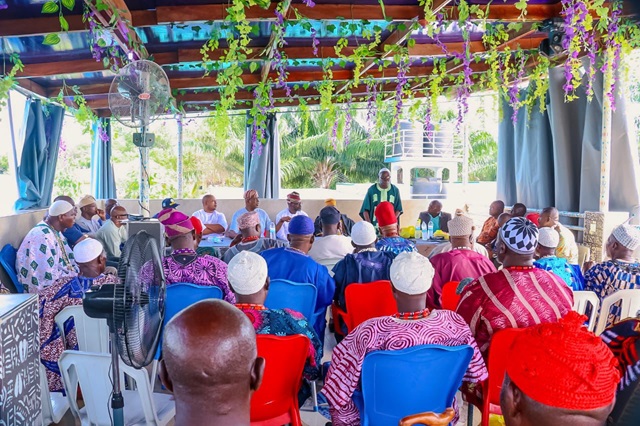- There will be no more land sales or allocations to herders
Leaders of Bunu land in Kabba-Bunu local government of Kogi state have resolved to form a community security task force to tackle crimes and activities of bandits in the area.
This was part of the resolutions reached at a critical emergency meeting convened by Bunu stakeholders.
The meeting, under the leadership of Olubunu of Bunu land, was attended by Bunu Traditional Council, Bunu Leaders Forum, key government officials, Bunu Development Association executives, Bunu Hunters and Vigilante Groups as well as other critical community stakeholders.
Leaders of Bunu land agreed that the task force will serve as a grassroots intelligence body and facilitate real-time communication with security agencies for rapid response and conflict prevention, to consolidate the efforts of the state government.
In addition, the meeting agreed that anyone, natives or migrants, caught acting as an informant or assisting the bandits with logistics would be treated the same way as bandits. Thus, the stakeholders agreed to meet frequently to assess the herder’s activities and to not allow any further unwanted guests without proper approval from security officials.

In a communiqué issued at the end of the emergency meeting, the stakeholders commended the government of Alhaji Usman Ododo for the human and capital resources deployed to Bunu, Okun and the state as a whole. They noted that they are aware that the government has continued to lose gallant men in their fight against these criminal elements during clearance operations across the land, and prayed that the efforts of the fallen heroes will not be in vain.
The communiqué jointly signed by HRM Oba Elijah Meseko, the Obaro of Odo-Ape Bunu; Professor Emeritus Olu Obafemi, the Chairman, Bunu Leaders Forum and Pastor J. F. Kolawole, the President, Bunu Development Association (BDA), said after comprehensive deliberations on the growing threats to peace and stability in the region, the following resolutions and appeals are hereby presented to the Government of Kogi State for immediate action:
“The Bunu Traditional Council and stakeholders unequivocally condemn the persistent and targeted killings, kidnappings, and violent attacks on Bunu indigenes by criminal elements, including armed herders. The communities have witnessed an alarming rise in abductions for ransom, day-time raids, and violent ambushes on rural roads and farm lands. These atrocities have caused wide spread fear, economic paralysis, and psychological trauma. The meeting strongly urges the government to treat the Bunu axis as a security emergency zone and deploy more kinetic and non-kinetic responses to end the violence.
“It is a well-known fact that the inhabitants of Bunu District are largely farmers who are hospitable and accommodating, whereas the herders’ major source of income is cattle rearing; thus, one should not take precedence over the other. There has been recurrent incidences where these herders direct their cattle to destroy the natives’ farms, while their own farms are not destroyed. This activities, the stakeholders believe, are calculated attempts which undoubtedly have negative impacts on farmers and the general population, both in terms of food security and economic worth. As a result, the conference has decided to take safeguards by using chemical remedies to protect their farms from further destructions.
“While stakeholders appreciate the state government’s efforts in strengthening various hunters and vigilante groups across Bunu, we urge more deployment of security forces to vulnerable parts of the Bunu District. Joint patrols comprising the police, civil defense, military, local vigilantes and hunters must be commissioned without delay to rescue those in the captivities of the kidnappers, deter further attacks and restore public confidence. Also, expediting the military Forward Operation Base (FOB), as well as establishment of a police station in Iluke Bunu, a community central to many sections of Bunu land and with access to Lokoja local government area and Niger State.
“The Meeting views the destruction of farm lands, poisoning of water sources as a result of cattle activities in rivers/streams, and targeted violence against farmers on their farms, as acts of economic warfare designed to displace and impoverish the indigenous population. The government is urged to launch an investigation into these patterns and bring perpetrators to justice, while also providing relief and compensation to affected farmers.
“The meeting resolved to form a Community Security Task Force, incorporating traditional leaders, youths, and hunters/vigilantes. This task force will serve as a grassroots intelligence body and facilitate real-time communication with security agencies for rapid response and conflict prevention, to consolidate the efforts of the state government. In addition, the meeting agreed that anyone (natives or migrants) caught acting as an informant or assisting the bandits with logistics would be treated the same way as bandits. Thus, the stakeholders agreed to meet frequently to assess the herder’s activities and to not allow any further unwanted guests without proper approval from security officials.”
The meeting expressed displeasure with the natives’ habitual land sales and urged the government to investigate and take necessary actions to revoke lands sold to migrant herders in Bunu District.
“Henceforth, there will be no more land sales or allocations to herders, they will only be allowed to rear their cattle, which must not be allowed to destroy farms or crops.
“Any indigene found culpable in indiscriminate selling of land, the meeting agreed, must face the law,” the stakeholders warned.
The Bunu Traditional Council and all stakeholders reiterate their commitment to peace, dialogue, and lawful coexistence and assured the Governor Ahmed Usman Ododo-led administration of their readiness to support the government’s initiatives and to work collectively toward building a more secure, stable, and prosperous Bunu District particularly and Kogi State at large.
They, however, we warned that failure to address these security and land-related threats may compel communities to take drastic self-preservation measures.




